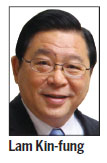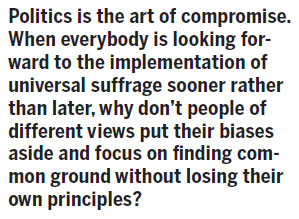Need for conversation on reform
Updated: 2013-06-01 08:03
By Lam Kin-fung(HK Edition)
|
|||||||||

President Xi Jinping in a recent speech encouraged Hong Kong residents from all walks of life to build better unity to achieve "strength by numbers". In fact, several State leaders expressed during the annual conferences of National People's Congress and Chinese People's Political Consultative Conference in March hopes for Hong Kong society to protect and enhance the city's long-term prosperity and stability for the sake of the nation's, as well as Hong Kong's, overall interest.
Today Hong Kong society is debating a host of issues and the most controversial has to be constitutional reform. Needless to say the next constitutional reform plan is much harder to put through than the last one, approved last year, because the 2012 plan was a step toward Chief Executive (CE) and Legislative Council (LegCo) elections by universal suffrage, while the next one will have detailed arrangements for the two elections by universal suffrage.
A scholar recently published a plan to push for "real universal suffrage" with an "Occupy Central" campaign that involves radical tactics, including the resignation of a "super-district councillor" to force a LegCo by-election he wishfully labeled as "referendum" and "paralyzing Central" by utilizing 10,000 or more protestors in a bid to make the central government meet his demands.

Personally, I don't condone the use of radical means to express one's opinions, including those concerning constitutional reform plans. One must be aware that the so-called "Occupy Central" campaign will adversely affect not only Hong Kong residents' daily life but also the city's financial, business and trade operations. It will even ruin Hong Kong's reputation as an international financial center. Just imagine what a chaotic society Hong Kong will become when traffic in Central is completely paralyzed, banks cannot open for business, companies cannot conduct normal trade, people cannot use certain ATMs and many shops are shut down. Local residents' daily life will be turned upside down for sure.
Moreover, the SAR government has yet to present a schedule and detailed plan for public consultation over the next phase of constitutional reform. It is grossly arbitrary to assume that the government will stage "fake universal suffrage" instead of a genuine democratic process and therefore start a fight with the government right away.
In fact, I have noticed there are different views regarding ways to implement universal suffrage. A recent public opinion poll found 39 percent of respondents support a pre-selection mechanism in the CE election by universal suffrage and 38 percent are against such an arrangement, indicating public opinion is far from "one-sided" over such issues.
I am a firm believer that conversation is better than confrontation, because confrontation not only offers no help to solving problems but also hurts the feelings of everyone involved; whereas conversation, or dialog, can lead to consensus through mutual understanding and compromise.
Now we have more than three years to prepare for the 2017 CE Election by universal suffrage. I trust there is enough time for Hong Kong society to discuss the matter rationally and pragmatically in a calm and collected manner. I also believe the SAR government is determined to reach the goal of turning the 2017 CE Election by universal suffrage into reality.
Politics is the art of compromise. When everybody is looking forward to the implementation of universal suffrage sooner rather than later, why don't people of different views put their biases aside and focus on finding common ground without losing their own principles?
The author is a legislative councillor and Hong Kong member of the CPPCC.
(HK Edition 06/01/2013 page6)